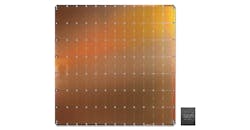Semiconductor Startup Shows Off the World’s Biggest Processor
In the semiconductor industry, bigger is not usually better. For 60 years, chip companies have strived to make the brains of computers as tiny as possible.
Startup Cerebras Systems will turn this maxim on its head on Monday when it unveils a processor measuring roughly 8 inches by 8 inches. That’s at least 50 times larger than similar chips available today.
The logic behind going big is simple, according to founder Andrew Feldman. Artificial intelligence software requires huge amounts of information to improve, so processors need to be as fast as possible to crunch all this data -- even if that means the components get really chunky.
The company’s Wafer Scale Engine chip is large because it has 1.2 trillion transistors, 400,000 computing cores and 18 gigabytes of memory. (A typical PC processor will have about 2 billion transistors, four to six cores and a fraction of the memory).
“Every square millimeter is optimized for this work,” Feldman said. “AI work is growing like crazy. Our customers are in pain.” The biggest limitation of current AI systems is that it takes too long to train software, he added.
Feldman has experience and industry backing that’s essential to tackling an engineering problem of this magnitude, he said. He co-founded server maker SeaMicro Inc. and sold it to chipmaker Advanced Micro Devices Inc. for more than $300 million in 2012. Cerebras has raised over $100 million from Silicon Valley investors including Benchmark, Andy Bechtolsheim and Sam Altman. Feldman has a team of 174 engineers and Taiwan Semiconductor Manufacturing Co. -- Apple Inc.’s chipmaker of choice -- is manufacturing the massive Cerebras processor.
Cerebras won’t sell the chips because it’s so difficult to connect and cool such a huge piece of silicon. Instead, the product will offered as part of a new server that will be installed in data centers. The company said it has test systems working at several large potential customers and will start shipping the machines commercially in October.
The AI chip market includes Nvidia Corp., Intel Corp. and U.K. startup Graphcore Ltd. Google has been so keen to speed up AI progress that the internet giant developed its own special chips called Tensor Processing Units.
Nvidia was the last company to successfully bring new semiconductor technology into servers, the machines that run data centers that Google, Facebook Inc. and others use to run internet services. Nvidia now gets almost $3 billion a year in revenue from the business, which took years and thousands of engineers to build, according to Chief Executive Officer Jensen Huang.
“It takes a long time to be successful in data center,” he said in an interview last week.
By Ian King
About the Author
Bloomberg
Licensed content from Bloomberg, copyright 2016.
